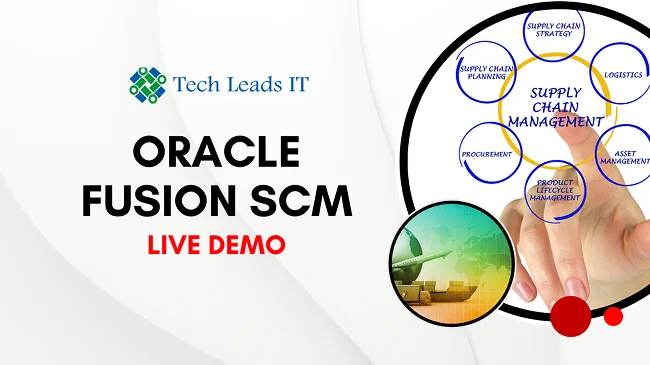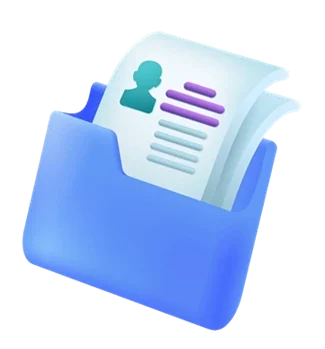Elevate your expertise
Best Seller
Master Oracle Fusion SCM at Tech Leads IT with Expert Training.Redwood ExperienceAI With SCM
Accelerate your career in Supply Chain Management with our comprehensive Oracle Fusion SCM Training! Master key concepts, gain hands-on experience, and position yourself for success in the industry with expert-led training on Oracle Fusion SCM modules.

Success Stories of Our Proud Achievers
Certified Success
Earn Your Badge of Excellence
Celebrate your success with an official certificate, proving your Oracle Fusion SCM expertise.

Official Certification
Earn a prestigious certificate upon successfully completing the course, validating your expertise in Oracle Fusion SCM
Industry Recognition
Enhance your resume with a widely respected credential that demonstrates your proficiency in supply chain management
Verifiable & Shareable
Receive a digital certificate with a unique verification link, allowing you to easily showcase your achievement on LinkedIn
Career Advancement
Gain in-depth knowledge and hands-on experience in Oracle Fusion SCM, helping you stand out from the competition
Top Oracle Cloud SCM Certifications
Oracle Inventory Cloud 2024 Implementation Professional
Oracle Order Management Cloud Order to Cash 2024 Implementation Professional
Oracle Cost Management Cloud 2024 Implementation Professional
Oracle Manufacturing Cloud 2024 Implementation Professional
Oracle Maintenance Cloud 2024 Implementation Professional
Oracle Fusion Transportation and Global Trade Management Cloud 2024 Implementation Professional
Oracle Warehouse Management Cloud 2024 Implementation Professional
Oracle Product Lifecycle Management 2024 Implementation Professional
Oracle Fusion Cloud Procurement 2024 Implementation Professional
Insights from Top Industry Professionals
“Trusted by Visionaries Who Drive Supply Chain Innovation.
See Why They Recommend Our Course for Professionals Worldwide.”



Faq
Frequently Asked Questions
Our Oracle Fusion SCM Training includes a comprehensive curriculum covering Product Management,Inventory Management, Procurement, Order Management and Costing. For a detailed module breakdown, please refer to our course syllabus.
The training sessions are conducted Monday to Saturday, with each class lasting 1 hour per day to ensure an interactive and structured learning experience.
Currently, we do not offer weekend batches. Our live sessions run Monday to Saturday to provide a consistent learning flow.
Yes, we provide recorded sessions for learners who prefer a self-paced learning approach. However, doubt clarification sessions are not available for self-paced training.
Yes, we offer internships based on your performance in mock evaluations, helping you gain real-world experience in Oracle Fusion SCM.
Downloads are not available through the web portal, but you’ll have secure access to all session recordings for 1 year. However, if you’re using our mobile learning app, you can download up to 20 videos to watch offline—ideal for learning without internet access.
No, our Oracle Fusion SCM training is structured as a comprehensive course, and individual modules cannot be taken separately.
Yes, we assist with resume preparation to help you showcase your skills effectively. Our expert team will guide you in creating a professional, job-ready resume tailored to Oracle SCM roles.
yes, having a Laptop or Desktop is essential to access the Oracle instance and complete hands-on exercises efficiently.
No prior experience is required! We cover everything from the basics. However, if you have knowledge of Oracle EBS R12, Logistics, or Supply Chain, it will be an added advantage. The course is open to all graduates, including those with a Degree, PG, B.Tech, etc.
Yes, we teach from the basics and progress to advanced concepts. This makes the Oracle Fusion SCM Online Training suitable for both freshers and experienced professionals. No prior experience is required to enroll.
Yes, we support your job placement journey by conducting mock interviews, resume preparation, and career guidance. Additionally, we have tie-ups with several companies, including Hitachi Vantara, Evosys, NTT Data, Tech Mahindra, LTI, AAIS, FIS Global, Splash BI, and Innovacx.
Yes, we guide you through the Oracle Fusion SCM certification process, offering expert advice and sample dumps to help you prepare effectively.
Yes, we provide daily session recordings through our learning portal, along with module-wise soft copy materials that include screenshots and navigation guidance.
Yes, we provide module-wise latest interview questions and assist with interview preparation through mock interviews.
Yes, we provide 6 months of instance access for practice. No software installation is required—just access through a URL link.
Yes, once you register for the Fusion SCM Cloud Online Training course, you will receive a 1-year membership, allowing you to attend multiple batches of the Oracle SCM Cloud Online Training.
Yes, we provide a Course Completion Certificate upon successfully finishing the training.
No, coding or programming knowledge is not required. This is a completely non-coding and functional course.
Yes, we offer one-on-one training upon request. Please note that the pricing for personalized training is higher compared to group sessions.
Get in touch
Have questions or need assistance? Reach out to us via email or call our support team. We're here to help!"
































































